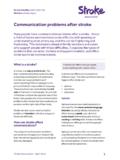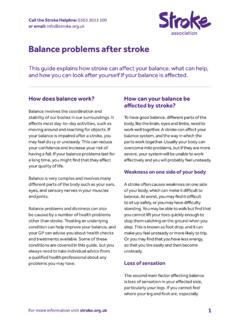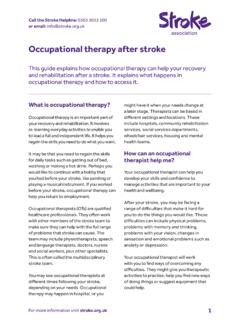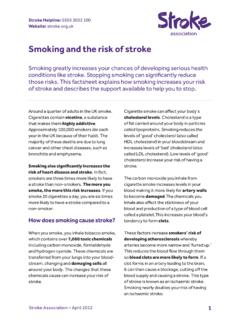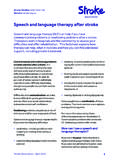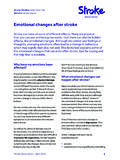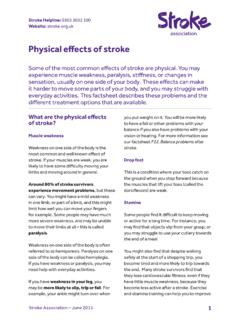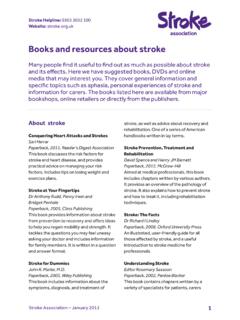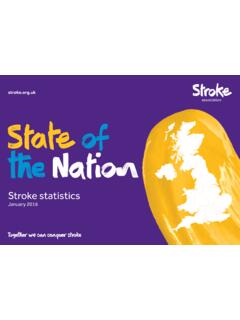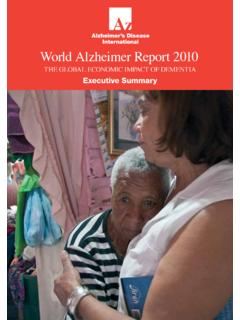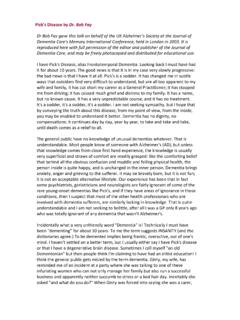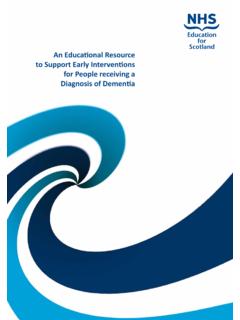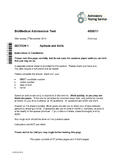Transcription of Stroke elline Wesite
1 Stroke Helpline: 0303 3033 100 Website: Association April 20121 dementia after strokeDementia is a life-changing condition that affects your ability to do everyday tasks. Over 600,000 people have dementia in the UK and it affects many more people, such as family members and friends. This factsheet is aimed at everyone affected by dementia . It explains some of the different types, in particular vascular dementia which is caused by Stroke , its diagnosis and treatment, and ways to access support and is dementia ?The word, dementia , is used to describe a group of symptoms that occur when the brain is damaged by specific diseases. This damage causes a decline in a person s ability to do things. A person with dementia may have: memory problems communication difficulties problems understanding reduced ability to concentrate mood changes.
2 dementia is a progressive condition, which means it gets worse over time. The way someone experiences dementia and the speed at which it progresses can vary. What are the different types of dementia ?There are different types of diseases and conditions that cause dementia . alzheimer s disease is the most common cause, accounting for 50 to 60 per cent of all dementia cases. It is a physical disease affecting the structure of the brain. Protein, known as clumps and tangles , start to form which damage the brain cells. Vascular dementia is the second most common form, accounting for approximately 20 per cent of all cases. It is caused when Stroke or small vessel disease affects the blood supply to the brain. This factsheet focuses on vascular temporal lobe dementia occurs when the frontal and temporal lobes of the brain are damaged.
3 It is a relatively uncommon form of dementia , and usually affects people under 65 with Lewy Bodies results from changes in brain tissue. Tiny deposits of protein are found in nerve cells. Their presence in the brain interferes with its normal functioning and causes damage to brain cells. What is vascular dementia ?Vascular dementia affects over 111,000 people in the UK. It is caused when there are problems with the blood supply to the brain. In order to work properly, the brain needs a Stroke Association April 20122 dementia after strokeconstant supply of blood. Blood is delivered to the brain via a network of arteries and blood vessels, which are part of the vascular system. If there are problems within the vascular system and blood cannot reach the brain cells they will become damaged and eventually Stroke can cause this type of damage.
4 There are two main types of Stroke . An ischaemic Stroke is caused by a blockage in the brain. This can happen when: a blood clot (thrombus) forms in a main artery to the brain, known as a cerebral thrombosis a blood clot, or fatty deposit, from another part of the body is carried in the blood- stream to the brain (called a cerebral embolism), or a blockage forms in the tiny blood vessels deep within the brain (called a lacunar Stroke ).A haemorrhagic Stroke happens when a blood vessel bursts, causing bleeding (a haemorrhage) either within, or on the surface of, the transient ischaemic attack (TIA), sometimes called a mini Stroke , is similar to a Stroke but the symptoms do not last as long, lasting from a few minutes to up to 24 of vascular dementia There are different types of vascular dementia .
5 Stroke -related dementiaThis can occur from one large Stroke and is called single infarct dementia . An infarct is the term for an area of cells that have not received their blood supply and have died as a infarct dementia This is caused by multiple mini strokes that take place over time giving rise to many tiny, widespread areas of damage. These strokes can be so small that a person may not know they are having them, in which case they are called silent strokes . Sub-cortical vascular dementiaSmall vessel disease can cause vascular dementia . This disease is where small vessels deep within the brain become completely blocked (called lacunar strokes). Over time this damage can develop into sub-cortical vascular dementia . A doctor might use the term Binswanger s disease to describe this.
6 Mixed dementiaAnother type of vascular dementia has recently been identified. alzheimer s disease and vascular dementia can occur at the same time, known as mixed dementia (MD). Usually one of the two dementias will be more dominant and this one is most likely to be are the risk factors for vascular dementia ?One of the risk factors for vascular dementia is Stroke . More than a quarter of people who have a Stroke develop vascular dementia within three months. Here are some general risk factors for developing vascular dementia . They are also risk factors for Stroke : Stroke Association April 20123 dementia after Stroke high blood pressure high cholesterol diabetes atrial fibrillation (a type of irregular heart beat) eating a high fat diet smoking drinking too much alcohol not doing enough exercise.
7 We have factsheets covering all these risk factors contact us for dementia is more common in men and usually starts before the age of 75. It is also more common among Asian and Black Caribbean people. This may be because both groups are more prone to risk factors like high blood pressure and diabetes. Genetic conditions can also increase your risk of developing vascular dementia . One such condition is CADASIL, an inherited disease, which occurs when thickening of blood vessel walls stops the blood supply to the brain. Usually affecting smaller vessels in the brain, it is a result of a change (mutation) in a gene. Symptoms associated with CADASIL are migraines and multiple strokes which usually start around the age of are the symptoms of vascular dementia ?
8 Having memory problems (especially difficulty recalling recent events) is a well-known sign of dementia . This is not necessarily the case for vascular dementia as the symptoms depend on the part of the brain affected by the Stroke . They include: weakness or paralysis on one side of the body incontinence balance problems and unsteadiness communication problems and difficulty following conversation mood changes such as everyone affected by Stroke will develop vascular dementia . As dementia develops, a person s condition will deteriorate and worsen, unlike after a Stroke . Vascular dementia tends to worsen in stages, with changes in a person s condition being stepped rather than gradual. This means that often people with vascular dementia deteriorate suddenly with each new Stroke and then make some improvement in between.
9 If you have vascular dementia caused by small vessel disease, symptoms may develop more this disease progresses other symptoms may develop which will be similar to other forms of dementia . A person may: behave inappropriately by screaming and shouting, be restless or display repetitive behaviour have a tendency to wander have difficulty carrying out everyday tasks and may not look after their personal hygiene hide or lose things and accuse people of stealing become very forgetful and confused about times, dates and their surroundings see and hear things that aren t there (hallucinations) become angry and easily upset. In the later stages of dementia , a person may not recognise their family and friends. They may need assistance to carry out household chores and personal tasks, and might not be able to express themselves or Stroke Association April 20124 dementia after strokeunderstand what is said to them.
10 Eventually someone may have to use a wheelchair or could become bedridden. Getting a diagnosisIf you think that you have vascular dementia , it is important that you talk to your doctor. It may help to take a friend or relative with you so that they can support first point of contact for most people is your GP. You may be then referred on to a memory clinic, a neurologist (brain specialist) or a psychiatrist who specialises in dementia for more tests and diagnose dementia correctly, you will have a number of tests. This will include a review of your personal and medical history (your doctor might ask you questions about your occupation, education and lifestyle), an assessment of your mental abilities, a physical examination including blood tests, a brain scan and a medication review.
